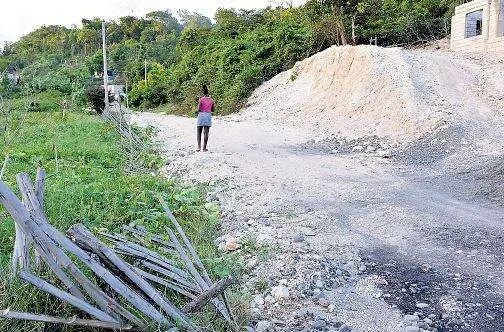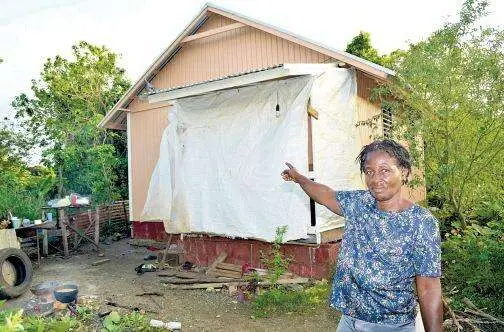
We’re very poor’
RESIDENTS of Donaldson, St Thomas, who are yet to take up Government’s offer of owning the land on which they have squatted for decades at a price of only $50,000 say they are too poor to afford it.
The Jamaica Observer North East reported last month that only 38 of the more than 400 titles prepared by state entity Housing Agency of Jamaica (HAJ) were collected at a special handing-over ceremony as the remaining residents were yet to pay for them.
Minister with responsibility for housing Dr Morais Guy and Member of Parliament for East St Thomas Dr Fenton Ferguson both used the opportunity to appeal to the other residents to take up the offer, which was renegotiated downward from an initial $150,000.
Team leader of community development at HAJ Lorenzo Sandford told the newspaper then that regularisation of communities like Donaldson is part of a heavily-subsidised programme and that the $50,000 is but a drop in the bucket when compared to the actual value of the lots.
But on a recent visit to the community, some residents who spoke with the Jamaica Observer North East said they desperately want to pay but simply cannot afford it because of the limited employment options available in the parish.
“Wi very poor and wi don’t have any money because is just little coal burning mi do because we can get nuh work,” said Grace Lee.
“Because wi unemployed wi always wonder if we would ever be able to afford to own this land because although we glad that them lessen the amount, some of we never see $50,000 one time,” she said.
Lee, who has one of the lots closer to the entrance of the development, said she has been informed by the HAJ that she would have to relocate to another lot further into the community since someone had expressed an interest in buying that piece.
“Them say I would have to move but I am going to try and find the money somehow to pay them because I am not moving from here so,” she said.
She added: “Thirty years ago when I came here to live it was all woodland and is me develop here so,” she said, pointing to her backyard garden.
Another resident, who identified herself as Annette Wilson, said a lot of single women are occupying the lots and they are unable to find employment.
“No work nuh dey here fi the ladies dem do; sometimes for six months di woman dem will get a little work to weed out the grass out the cane over at the (sugar) property but it is like slavery work,” she said, adding that for the rest of the year they can barely feed their families.
Carmen Scott said she, too, has been unable to pay for her title because she has not been employed for a very long time as her common-law husband who had stopped her from working outside the home was no longer supporting her.
“Him did stop me from work and now me and him having problems because him come and beat me up and now mi nuh know what to do because is fi me and fi him name did send up (to HAJ) and mi nuh want no title in a both we name,” she said.
Scott said if she had the money she would, however, pay to get the title so she can stay on the land as there is nowhere else for her to go.
“When me able to pay for it that will be a good day because it will mean that at my age mi would finally get to have something fi miself,” she said.
Other than those who could not afford it, some residents said they did not make any effort to make payments as they were doubtful that they would have received titles had they paid.
“Things (were) really sounding contrary over the years and we did fraid that if we did pay we money we wouldn’t get no title or get it back,” said Lydia McDonald.
A lot of the plots are yet to be occupied as many of the prospective owners have not yet moved in.
“People weren’t very sure before, but now that we see the titles dem issue out people going to try to push little harder to see if them can come up with the money,” McDonald said.
Meanwhile, however, although they are not yet title holders, the residents are pleading with those responsible to install street lights, piped water as well as a paved road to replace the dirt track now in place.
Student Rhoddane Wallace said he needs the road to be repaired as he is unable to get out of the community when it rains.
“When it rains it is like a pig sty we live in and the whole ah mi uniform dirty up by the time mi reach school,” he complained.
The owners of the Donaldson property, which adjoins Duckensfield Sugar Estate, originally leased the land for farming in the early 1990s. At the time, a few people, some of whom were farmers who wanted to remain close to their farms, informally took up residence.
However, farming did not yield the kind of returns they were expecting and the land was subsequently incorporated under Operation PRIDE whose mandate it was to upgrade squatter settlements to formal communities with the requisite infrastructure.
Some aspects of the programme, which was managed by the now defunct National Housing Development Corporation, were taken over by the HAJ, formed when the former merged with Caribbean Housing Finance Corporation Limited and National Housing Corporation Limited.


























